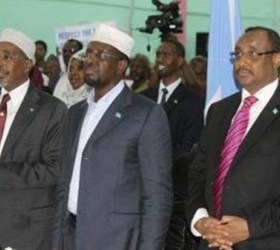
Somalia's first formal parliament in more than 20 years has been sworn in in the capital, Mogadishu, marking an end to an eight-year transitional period.
The MPs are holding their first session at the main airport, one of the most heavily secured areas of the city.
Their main task will be to elect a new president - a vote expected within a week or two.
Outgoing moderate Islamist President Sheikh Sharif Sheikh Ahmed, in power since 2009, is regarded as a favourite.
Other strong candidates include Prime Minister Abdiweli Mohamed Ali and former parliamentary speaker Sharif Hassan Sheikh Aden.
It is a critical moment for the country which, since the overthrow of President Siad Barre in 1991, has seen warlords, Islamist militants and its neighbours all taking a hand in its affairs.
With the help of African Union troops, the interim government has been able to gain control the capital, but al-Shabab - an armed group that has joined al-Qaeda - runs many central and southern areas of the country.
'Favours and intimidation'
Members of the new parliament spent Monday morning at the country's main airport, which is under protection of the African Union force, being accredited.
The new parliament, to be made up of a lower house with 275 members and an upper house with a maximum of 54 members, is holding its first session.
So far, 211 MPs have been sworn in - enough for a quorum - by clan elders and vetted by a technical selection committee to eliminate people accused of war crimes.
The MPs' first meeting comes on the day the mandate for Somalia's UN-backed transitional government expires.
According to tradition, the interim speaker of parliament is the oldest MP - Gen Muse Hassan. He will oversee the formation of an electoralcommission that will organise the vote of the new parliamentary speaker and the president.
Analysts say Somali politicians, the United Nations and other outside powers have been working frantically to ensure a new authority is in place.
It has been a long and difficult process as the country has been without effective central authority for so long that numerous power bases have emerged.
The selection of MPs has not been without criticism.
Earlier this month, the UN special representative for Somalia, Augustine Mahiga, said "favours, bribes and intimidation" had been involved during the appointments.
On Sunday, representatives from the international community flew into Mogadishu for final talks with Mr Ahmed and to resolve a problem over the issuing of identity cards for MPs.
The president had halted the identity cards after the selection committee rejected some proposed members of his clan.
But the process so far has been generally welcomed by the international community.
"The conclusion of the transition should mark the beginning of more representative government in Somalia," said a statement released by the UN.
"Whilst parliament remains a selected rather than elected body, it is essential that it cuts its ties with the past of self-interest and warlordism, and is populated by a new generation of Somali politicians, including the proper representation of Somali women."
Somali affairs analyst Mohammed Adbullahi Hassan says whoever is elected will have more legitimacy and the end of the transitional period means the country will no longer be considered a pariah state.
But the credibility of Somali politicians - accused in a recent UN report of "systematic embezzlement" - is an issue, he says.
The main criteria for president seemed to be "who has the deepest pockets", he told the BBC's Newsday programme.
Source: BBC
No comments:
Post a Comment